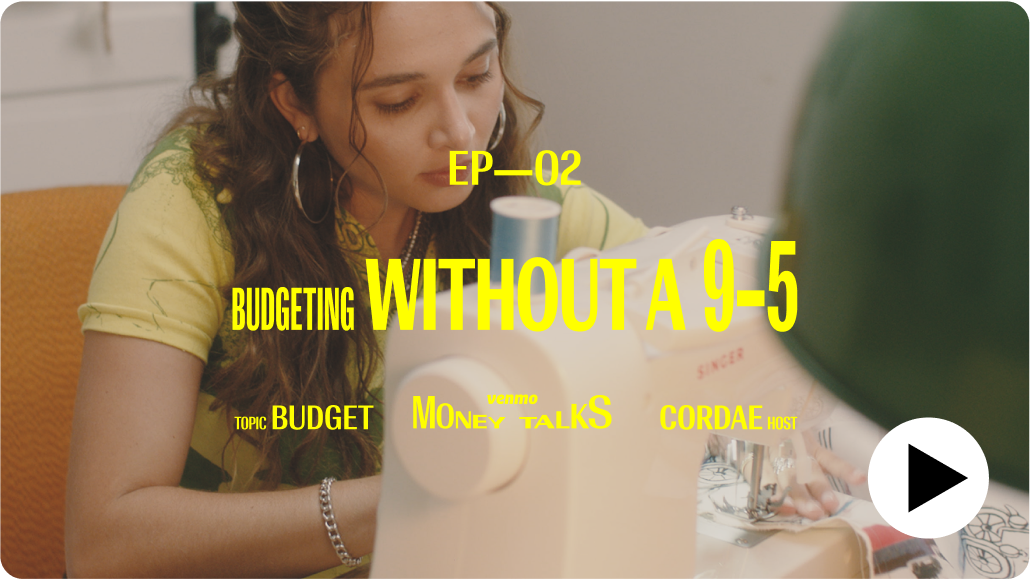Educational resources for helping you develop financial skills.
A Q&A about everyday situations and tips related to money.
Budgeting your money.
Money Talks feat. Cordae
Season 1
Your relationship with money is unique and likely to change over time. And while there’s no one-size-fits-all approach to spending, here’s how you can find a balance between your needs, wants, and savings.
This content reflects the real-life experiences of individuals. Participants received compensation for sharing their stories. Venmo is not making any recommendations regarding finances. Consider seeking advice from your financial advisor.
The 3 spending categories.
Needs
Your needs are exactly what they sound like: the necessities. Expenses like rent, groceries, and transportation that are essential for your everyday life.
Wants
Things that make your life fun—like trips, takeout, and concert tickets.
Savings
Money that might go toward a large future purchase, such as a car or vacation, or help you make it through an emergency.
Going over budget?
Whether you’re dealing with high living expenses, managing debt, or simply not earning as much as you’d like, there are many reasons why your needs might make up the bulk of your monthly spending.
Get creative.
You can try increasing your monthly income by starting a side gig or finding creative ways to lower your monthly needs.
Lean on your community.
If your needs feel overwhelming, don’t be afraid to ask a financial planner, a loved one, or your community for advice or assistance.
Show yourself compassion.
Remember that tough financial times don’t last forever. Your net worth is not a reflection of your self-worth.
If you’re making enough money to cover everyday expenses, but still feeling like you live paycheck to paycheck, it may be time to examine your wants and spending habits.
Watch out for lifestyle inflation.
You might notice spending begin to rise as you advance in your career. It can be nice to reward yourself with things you enjoy but be sure your spending doesn’t outpace your savings.
Set some aside.
You should consider saving a portion of every paycheck for your cash reserve to cover you should an unexpected expense arise.
Buy what you love – budget the rest.
Rides and takeout offer short-term comfort, but they might ultimately stand in the way of your larger financial goals. Consider placing a limit on categories that don’t bring you long-term happiness.
If most of your money is going directly to savings, you’re probably well-prepared for the future and any bumps along the way – but that doesn’t mean your relationship with money is stress-free.
Avoid restrictive spending patterns.
If you find yourself struggling to make basic purchases, even though you earn enough to afford them, you may be limiting yourself too much.
Invest in you.
Give yourself permission to spend money on the things you value, and remember that investing in health and happiness is investing in yourself.
Let your money grow.
Once you’ve hit your savings goal, try diversifying your assets with an investment portfolio. If you’re new to investing, be sure to go at your own pace and consult an expert if needed.


When you spend your money right, it gets the chance to work for you. The Venmo Debit Card offers up to 5% cashback with no monthly fee or minimum balance.*
Learn more
Tackling your financial anxiety.
Face your bank account.
If you have trouble checking your bank account, you’re not alone—it’s one of the top symptoms of financial anxiety. As you assess your spending habits, remember to treat your past self with kindness and without judgment
Make a list of goals.
Your goals can be anything from paying down debt or saving for a big purchase to just learning to give yourself permission to spend the money you make. They’re completely up to you.
Taking the time to reflect on your goals can help you build confidence in your financial future and remind yourself what it is you’re working towards
Give yourself time.
The most important ingredient to building a healthier financial future is time, so focus on making smaller, meaningful changes you can commit to—ones that align with your goals and help bring your needs, wants, and savings into greater balance.
Related content

Season 1
Feat. Cordae
Budgeting Without A 9-5
Being your own boss means new responsibilities. Find out how you can build savings to help with unexpected costs.
Looking for more?


Explore a Q&A with financial experts and more on our YouTube channel. Follow along and you’ll be notified when new content drops.

